Mark Anthony Neal's Blog, page 550
December 23, 2016
Marvin Gaye -- "Purple Snow Flakes" (1965)
 The most ambitious of Marvin Gaye's original Christmas songs, "Purple Snow Flakes," recorded in 1965, remained in the vaults for nearly three decades. The music, though, was re-purposed (can't waste nothing on the assembly line), for the pop hit "Pretty Little Baby" (1965).
The most ambitious of Marvin Gaye's original Christmas songs, "Purple Snow Flakes," recorded in 1965, remained in the vaults for nearly three decades. The music, though, was re-purposed (can't waste nothing on the assembly line), for the pop hit "Pretty Little Baby" (1965).
Published on December 23, 2016 14:53
December 22, 2016
Janelle Monae Discusses Her Role in the Film 'Hidden Figures'
 'Janelle Monae talk about her role in the film, Hidden Figures, where she portrays Mary Jackson, who worked at NASA and was one of three African-American women mathematicians -- human computers -- behind the launch of the Apollo space program.' -- +BUILD Series
'Janelle Monae talk about her role in the film, Hidden Figures, where she portrays Mary Jackson, who worked at NASA and was one of three African-American women mathematicians -- human computers -- behind the launch of the Apollo space program.' -- +BUILD Series
Published on December 22, 2016 19:56
"To August Wilson With Love”: Fences Review by Stephane Dunn
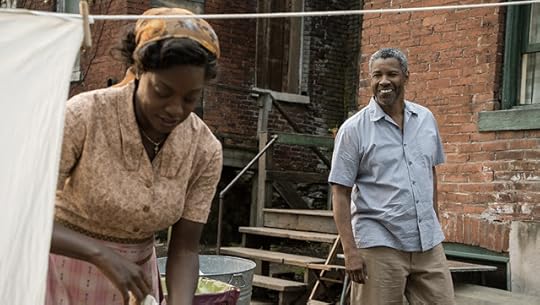 "To August Wilson With Love”: Fences Review by Stephane Dunn | @DrStephaneDunn | NewBlackMan (in Exile)
"To August Wilson With Love”: Fences Review by Stephane Dunn | @DrStephaneDunn | NewBlackMan (in Exile)Sometimes a film compels such an emotionally visceral and intellectual experience that it reminds us how beautifully true artistic work and entertainment should and can meld together. Fences does just that thanks to the late great August Wilson -- playwright and screenplay author of the Paramount film adaptation of his play Fences, director Denzel Washington, and this year’s tour de force in ensemble acting with Washington, Viola Davis, Mykelti Williamson (Gabriel), Stephen Henderson (Bono), Russell Hornsby (Lyons), and Jovan Adepo (Corey Maxson), and Saniyya Sidney (Raynell).
At the risk of giving those recently talked about too ‘white’ award shows even more attention, I will mention that the Golden Globes chose not to recognize the brilliance in Mr. Washington’s directorial approach to Fences, which was, in his words, to ‘get out of the way’. Whether the annual over-hyped award season follows the Globes and decides to choose between Mr. Washington’s worthy performance of Troy Maxson and his worthy direction instead of honoring both as they should, it does not lessen the achievement.
In that deceptively simple summation of his approach to directing Fences, Mr. Washington treats Wilson’s work reverently and wisely, knowing and understanding intimately the treasure in Wilson’s writing, the bluesy tragicomedy, his masterful lyrical ear for the signifying, vernacular voices of African American people, and his deft touch at creating layered, generational and historical conflict, compelling characters, and weighty stories.
All of the above are on display in the Pulitzer prize winning Fences – a larger than the screen black father, Troy, his restless almost a man son Corey, straining against his father’s dominance and the impact of history, race, class, and gender politics on the father's psyche and parenting, a devoted, magnanimous housewife (Rose), simmering under the surface of that seemingly placid traditional domesticity, an African griot-Greek drama seer-like, second sight gifted, mentally ill brother, Gabriel, a dreamy, slightly wayward, Jazz artist first son (Lyons), and a best friend (Bono) – too perfect as a funny, wise, supportive foil to be called a sidekick.
In the translation of Fences from the stage to screen, Washington stays faithful to the wealth that Wilson created with the cinematography -- close-ups, transitions, blurred shots, and stripped down, and realistic settings supporting the star features – story, writing, and character performances.
The screen adaptation retains something precious and very pivotal to the theatrical experience – the language and character driven story demands that viewers hear and revel in its richness and beauty. In other words, it begs viewers to see, listen, and hear. Viewers who have never read or seen an August Wilson play or checked him out in written or oral interviews may come to the film not prepared for how the work will invite them to stay still and listen so they can luxuriate in the tapestry of color, sound, and words spilling out philosophical profundity in the mixed jazz and blues notes of the dialogue.
Mr. Washington obviously takes advantage of his years long familiarity with Wilson, his award winning stage interpretation of the main character, and the relationships between the stellar actors who have all, save for young Adepo and Sidney, interpreted these characters on stage previously; their regard for what Wilson created on the page and the opportunity to bring it to life is evident in every performance.
In a cast of standout performances, Ms. Davis, letting all the ugly and the beautiful hang gut deep out in this cinematic reprisal of her Tony award winning role as Rose Maxson is a wonder that lingers in the mind’s eye and reverberates in the ear. That’s what the profound, if an actor achieves it, does. Davis’s turn as the loyal wife betrayed by her husband who comes to recognize her complicity in minimizing her selfhood for his will still reverberate though Fences is set in the 1940s.
Women are certainly in August Wilson’s dramas, mostly as essential secondary characters, as points of black men’s focus, discussion, love, distress and support, and as historically and symbolically hugely important agents (Ma Rainey’s Black Bottom, for example). Among these, Rose Maxson is quite memorable and not merely for being the lead female character and wife to the larger-than-life major character, but because this role is problematized some and spoken aloud to and in Davis’s portrayal, ripped raw and brought painfully to the fore.
It’s absurd that August Wilson would ever have had to offer any considerable commentary explaining why he focused on the African American experience in his dramas and whether or not in doing so, it risked universal [read mainstream] appeal. Imagine Tennessee Williams or Thorton Wilder or Arthur Miller having to engage interviewer questions about focusing on white people or questioning about whether their plays spoke across perceived racial and cultural boundaries.
The film adaptation of Fences will put several key notes into a glaring spotlight and the first is how utterly absurd and insulting that kind of questioning to Wilson and about his work really was. It will also highlight how an industry which owes a lot to American theatre and its playwrights has failed to plume the rich canvas of August Wilson stories, and not been all over getting more of Wilson’s American century cycle (ten plays) to the big screen. The last major movie treatment of his work occurred on television with 1995’s The Piano Lesson starring Wilson stage play veteran Charles S. Dutton and Alfre Woodard.
With Fences, Mr. Washington and his formidable cast demonstrate something a lot of us knew but still too many do not know but hopefully may now: Wilson is a great maestro of distilling the complicated and simple, humanly universal yet distinctive souls of black folk into our vernacular genius.
+++
Stephane Dunn is a writer and professor and the director of the Morehouse College Cinema, Television, & Emerging Media Studies Program (CTEMS). Her publications include the 2008 book Baad Bitches & Sassy Supermamas: Black Power Action Films (U of Illinois) and a number of articles in mediums such as Ebony.com, The Atlantic, The Root.com, Bright Lights Film journal, and others. Follow her on Twitter at twitter @DrStephaneDunn and www.stephanedunn.com.
Published on December 22, 2016 18:25
Power to the People: A Conversation with Photographer Stephen Shames + Black Panther Co-Founder Bobby Seale
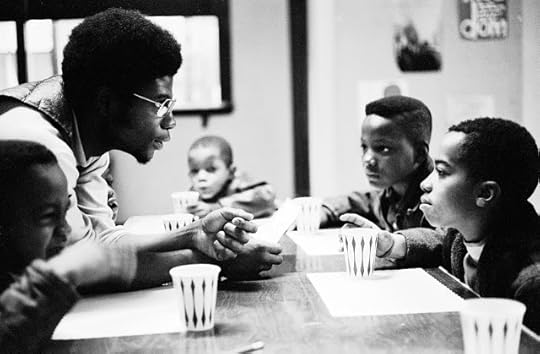 Stephen Shames'Esteemed photographer, Stephen Shames, and Black Panther founder, Bobby Seale in a discussion at the +Smithsonian National Museum of African American History and Culture moderated by Hasan Jeffries, Ph.D., Professor of History and author of Bloody Lowndes: Civil Rights and Black Power in Alabama’s Black Belt. Shames and Seale have collaborated on the new book
Power to the People: The World of the Black Panthers
.'
Stephen Shames'Esteemed photographer, Stephen Shames, and Black Panther founder, Bobby Seale in a discussion at the +Smithsonian National Museum of African American History and Culture moderated by Hasan Jeffries, Ph.D., Professor of History and author of Bloody Lowndes: Civil Rights and Black Power in Alabama’s Black Belt. Shames and Seale have collaborated on the new book
Power to the People: The World of the Black Panthers
.'
Published on December 22, 2016 06:42
Word Work: A Conversation with Melissa Harris-Perry + Karla FC Holloway
 'Upon her retirement from Duke University, Professor Karla FC Holloway, the James B. Duke Professor of English and professor of African American Studies shares lessons and experiences in conversation with her former student. Melissa Harris-Perry is the Maya Angelou Presidential Chair and director of the Anna Julia Cooper Center at Wake Forest University. They were joined on stage by Blair LM Kelley, an assistant dean at NC State University, and Kerry Haynie, co-director of the +Duke Council on Race and Ethnicity.'
'Upon her retirement from Duke University, Professor Karla FC Holloway, the James B. Duke Professor of English and professor of African American Studies shares lessons and experiences in conversation with her former student. Melissa Harris-Perry is the Maya Angelou Presidential Chair and director of the Anna Julia Cooper Center at Wake Forest University. They were joined on stage by Blair LM Kelley, an assistant dean at NC State University, and Kerry Haynie, co-director of the +Duke Council on Race and Ethnicity.'
Published on December 22, 2016 05:09
'Spatializing Blackness: Architectures of Confinement + Black Masculinity in Chicago'
 'In this talk, Rashad Shabazz, explores how carceral power and the techniques of containment were woven into the quotidian geographies of poor and working class Black people on Chicago's South Side. Through and examination of housing, policing, and the production of masculinity, this Shabazz demonstrates how the explosion of Black incarceration rates in the latter 20th century were enabled by the geography of incarceration at the beginning of the century. Shabazz is Associate Professor in the School of Social Transformation at Arizona State University.' -- +Brown University
'In this talk, Rashad Shabazz, explores how carceral power and the techniques of containment were woven into the quotidian geographies of poor and working class Black people on Chicago's South Side. Through and examination of housing, policing, and the production of masculinity, this Shabazz demonstrates how the explosion of Black incarceration rates in the latter 20th century were enabled by the geography of incarceration at the beginning of the century. Shabazz is Associate Professor in the School of Social Transformation at Arizona State University.' -- +Brown University
Published on December 22, 2016 04:56
December 20, 2016
Unerased: Mic's Database of Trans Lives Lost to Homicide in the US
 'Created by Mic, '
Unerased
' is a comprehensive database of transgender Americans who have died by homicide since 2010.' -- Mic
'Created by Mic, '
Unerased
' is a comprehensive database of transgender Americans who have died by homicide since 2010.' -- Mic
Published on December 20, 2016 16:24
'Piedmont Blues: A Search for Salvation' w/ Gerald Clayton & The Assembly featuring René Marie
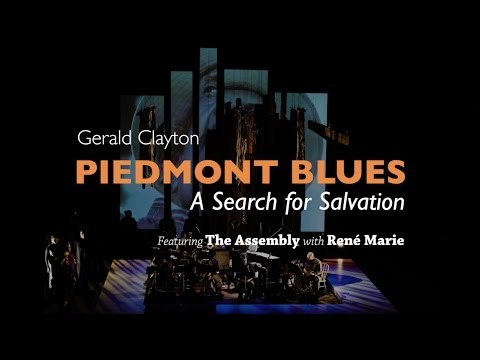 A film short for 'Piedmont Blues: A Search for Salvation' featuring Gerald Clayton & The Assembly with René Marie. Conceived and Composed by Gerald Clayton; Directed by Christopher McElroen.
A film short for 'Piedmont Blues: A Search for Salvation' featuring Gerald Clayton & The Assembly with René Marie. Conceived and Composed by Gerald Clayton; Directed by Christopher McElroen.
Published on December 20, 2016 16:10
Rethinking Slavery: 21st Century Research of Slavery, Sex & Gender
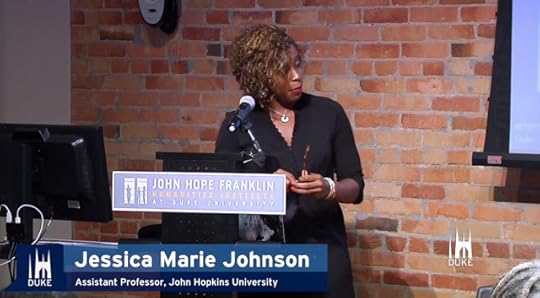 'Rethinking Slavery was a symposium examined the archival and popular representation of chattel slavery, as altered by the cultural and technological transformations of the 21st century. The opening panel examined 21st Century research on Slavery, Sex and Gender with Jessica Marie Johnson, Assistant Professor, John Hopkins University ("La Traversée: Free/Black/Female Crossings in a World of Atlantic Slavery"); Lamonte Aidoo, Andrew W. Mellon Assistant Professor, Duke University ("Black Freedom and the Paradoxes of White Supremacy in Pre-Emancipation Brazil"); William Andrews, E. Maynard Adams Professor of English, University of North Carolina-Chapel Hill ("Class Awareness in Antebellum Slave Narratives").
'Rethinking Slavery was a symposium examined the archival and popular representation of chattel slavery, as altered by the cultural and technological transformations of the 21st century. The opening panel examined 21st Century research on Slavery, Sex and Gender with Jessica Marie Johnson, Assistant Professor, John Hopkins University ("La Traversée: Free/Black/Female Crossings in a World of Atlantic Slavery"); Lamonte Aidoo, Andrew W. Mellon Assistant Professor, Duke University ("Black Freedom and the Paradoxes of White Supremacy in Pre-Emancipation Brazil"); William Andrews, E. Maynard Adams Professor of English, University of North Carolina-Chapel Hill ("Class Awareness in Antebellum Slave Narratives"). "Rethinking Slavery in the 21st Century: Images and Archives" was co-sponsored by the Duke University's Department of African and African American Studies (AAAS), the Art, Art History & Visual Studies department, the Forum for Scholars and Publics, and the Franklin Humanities Institute (FHI).
Published on December 20, 2016 15:58
Left of Black S7:E10: “Black Righteous Space” – A Conversation with Hank Willis Thomas
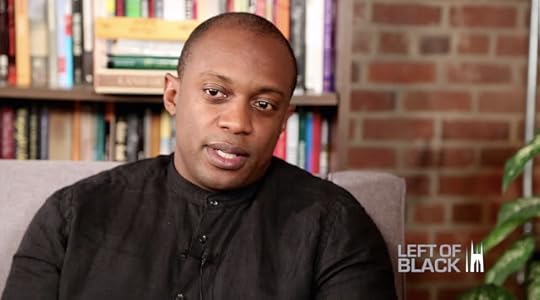 Left of Black S7:E10: “Black Righteous Space” – A Conversation with Hank Willis Thomas
Left of Black S7:E10: “Black Righteous Space” – A Conversation with Hank Willis ThomasOn this episode of Left of Black noted photo-conceptual artist Hank Willis Thomas, joins host Mark Anthony Neal on the occasion of the Annual Barbra and Andrew Rothschild Lecture at the Nasher Museum at Duke University. Thomas discusses his installation “Black Righteous Space” which is featured in the exhibit Southern Accent: Seeking the American South in Contemporary Art and the opening of the National Museum of African American History & Culture.
Left of Black is a weekly Webcast hosted by Mark Anthony Neal and produced in collaboration with the John Hope Franklin Center at Duke University and in conjunction with the Center for Arts + Digital Culture + Entrepreneurship (CADCE) and the Duke Council on Race + Ethnicity.
***
Follow Left of Black on Twitter: @LeftofBlack
Published on December 20, 2016 15:35
Mark Anthony Neal's Blog
- Mark Anthony Neal's profile
- 30 followers
Mark Anthony Neal isn't a Goodreads Author
(yet),
but they
do have a blog,
so here are some recent posts imported from
their feed.



